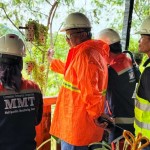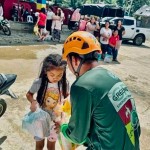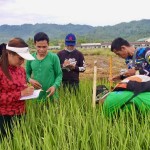IP rights and environment are well protected under Mining Act and IPRA
Gualberto Guitao, an agriculture student at the Jose Rizal Memorial State College
(JRMSC) in Siocon, Zamboanga del Norte, had been thinking about the future of
his tribe in Canatuan. He feared that the rights of the Subanons to their ancestral
domain and the environment around it would all be lost because of the activities
of a mining company in the area.
But Guitao’s apprehensions were quickly replaced by understanding, and
then by enlightenment and hope, when he and his fellow students – Subanons
and non-Subanons alike who had shared his fears – participated in the
first of the “Roaming Lecture Series on the Philippine Mining Act of 1995
and the Indigenous Peoples Rights Act or IPRA” inside the JRMSC campus.
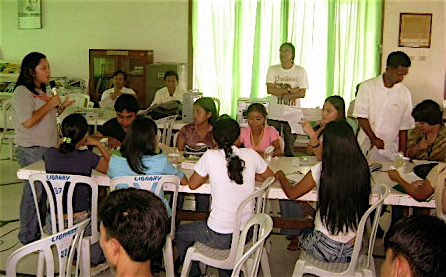
Emma Deverala, Mines and Geosciences Bureau Region 9 Information Officer (standing, extreme left), discusses some fine points of the Mining Act of 1995 with JRMSC student leaders. “This is all about encouraging the IPs to actively participate in the monitoring of mining activities in their ancestral domain.”
Bureau and TVI Resource Development Philippines, Inc. (TVIRD), which operates
a mine in Canatuan on the mountainous eastern part of Siocon. It was attended
by officers and members of JRMSC’s Supreme Student Government (SSG), who
later on told organizers that they have finally realized that the perceived threats
to their rights and to the environment are but products of misinformation. A lot
of negative things have been said about mining, particularly in recent years on
account of the intensified anti-mining campaign all over the Philippines.”My fear and doubts are now gone. Now I know my rights as an indigenous person (IP) and how our environment is safeguarded under the Mining Act. What we have to do now is closely monitor the mining operations in our village,” Guitao commented after the activity.
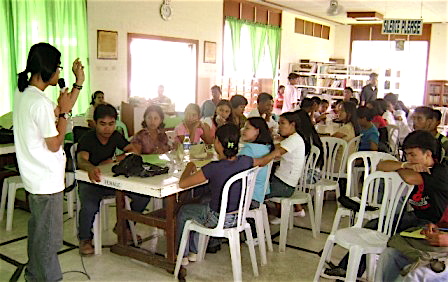
Providing stakeholders the opportunity to participate in discussions on issues that directly affect their rights and their community. Jose Dagala, TVIRD information officer (standing, in white shirt), stresses a point during the lecture.
Relations and Development Office (CReDO) explained: “The lecture series
was conceptualized as part of the Company’s Information-Education-Communication
program and is being pursued primarily to educate the Subanons and other stakeholders
on the provisions of the Mining Act and IPRA. We believe that through this,
they will have a tool that they can use to monitor the activities of our Company.
They will also have the opportunity to participate in discussions on issues
that directly affect their rights and their community. This is all about encouraging
the IPs to actively participate in the monitoring of mining activities in their
ancestral domain.”
Dagala facilitated the conduct of the lecture, and was ably
supported by his counterpart at the MGB, Emma Deverala, and by TVIRD consultant
on IP Affairs, Bing Damaso. They ably fielded questioned from the 45 students
and five professors, who were visibly pleased with the answers.
“We are very thankful to MGB and TVIRD for this activity.
We were also quite apprehensive of the mining activities in our town. But we
now know that under the Mining Act, mining operations are now closely being
watched and are being done responsibly by mining companies,” Rosemarie
Brillantes, JRMSC SSG vice president, said.
Plans to conduct the lecture series in other areas are being
made to enable TVIRD to educate residents in its host and impact communities
on relevant provisions of the Mining Act and IPRA.
TVIRD is licensed to mine gold and silver in a 508-hectare
area within Canatuan under a Mineral Production Sharing Agreement with the Philippine
government. The Company will begin producing copper and zinc in the same area
in mid-2008.
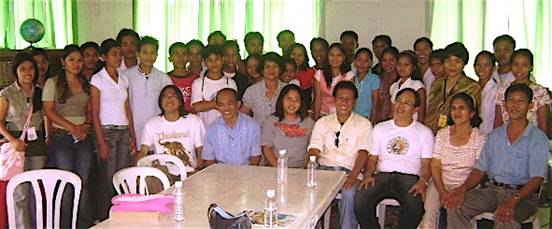
A total of 45 student leaders and five professors of JRMSC attended the first in the series of lectures on the Mining Act and the Indigenous Peoples Rights Act. “We now know that mining operations are now closely being watched and are being done responsibly by mining companies.”

